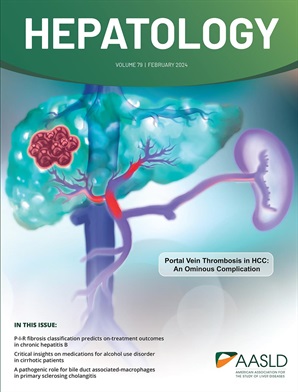DGKH 介导的磷脂酸代谢是肝细胞癌自我更新和耐药性的驱动因素
IF 15.8
1区 医学
Q1 GASTROENTEROLOGY & HEPATOLOGY
引用次数: 0
摘要
肝细胞癌(HCC)的特点是代谢途径畸变,这使癌细胞能够满足其能量需求并加速恶性进展。鉴别支配 HCC 耐药性和自我更新的新型代谢参与者至关重要,因为这些特性很可能是肿瘤复发的原因。利用TCGA中HCC患者的临床特征和RNA-seq进行了加权基因共表达网络分析,其中一个模块与晚期病理分期和干细胞群维持显著相关。通过整合从对酪氨酸激酶抑制剂无应答的HCC患者那里获得的数据,对该模块进行了进一步分析,发现了361个常见的失调基因,这些基因明显富集于细胞内信号转导通路,其中二酰甘油激酶eta(DGKH)是分化不良的HCC肿瘤中最富集的基因。在临床上,与非肿瘤组织相比,DGKH 在肿瘤组织中的表达更高。DGKH 表达较高的患者表现出更多的未分化状态,对 TKIs 的反应较差。使用DGKH操纵的HCC细胞系进行的功能测试表明,DGKH增强了侵袭性特征,包括癌症干性、耐药性和转移性。在DGKH的上游,我们发现E1A相关蛋白p300(EP300)与DGKH的启动子区域结合,从而增加了其转录组表达。从机制上讲,DGKH 通过产生磷脂酸(PA)来促进 mTOR 信号转导。在免疫功能正常的小鼠模型中,索拉非尼和肝脏定向AAV8介导的Dgkh去势联合治疗可显著减少肿瘤负荷、自我更新、PA生成和mTOR信号转导。我们的研究表明,DGKH是癌症干性和耐药性的一个关键的肿瘤代谢调节因子,抑制DGKH可以更有效地治疗肝细胞癌。本文章由计算机程序翻译,如有差异,请以英文原文为准。
DGKH-mediated phosphatidic acid oncometabolism as a driver of self-renewal and therapy resistance in hepatocellular carcinoma
Hepatocellular carcinoma (HCC) is characterized by metabolic pathway aberrations, which enable cancer cells to meet their energy demands and accelerate malignant progression. Identifying novel metabolic players governing therapy resistance and self-renewal in HCC is crucial, as these properties are likely responsible for tumor recurrence. Clinical traits and RNA-seq of HCC patients in TCGA were used for weighted gene co-expression network analysis, where one module was significantly correlated with advanced pathological stage and stem cell population maintenance. Further analysis of this module by integrating data obtained from HCC patient nonresponders to tyrosine kinase inhibitors identified 361 commonly deregulated genes significantly enriched in the intracellular signal transduction pathway, with diacylglycerol kinase eta (DGKH) ranked as the most enriched gene in poorly differentiated HCC tumors. Clinically, DGKH was elevated in tumor tissues compared to non-tumor tissues. Patients with higher DGKH expression exhibited a more undifferentiated state and were less responsive to TKIs. Functional assays using DGKH-manipulated HCC cell lines demonstrated that DGKH augmented aggressive features, including cancer stemness, therapy resistance, and metastasis. Upstream of DGKH , we discovered that the E1A-associated protein p300 (EP300) binds to DGKH’s promoter region, thereby increasing its transcriptomic expression. Mechanistically, DGKH promotes mTOR signaling by producing phosphatidic acid (PA). In an immunocompetent mouse model, co-treatment with sorafenib and liver-directed AAV8-mediated Dgkh depletion significantly reduced tumor burden, self-renewal, PA production and mTOR signaling. Our research demonstrated that DGKH is a crucial oncometabolic regulator of cancer stemness and therapy resistance, inhibition of which may lead to more effective hepatocellular carcinoma treatment.
求助全文
通过发布文献求助,成功后即可免费获取论文全文。
去求助
来源期刊

Hepatology
医学-胃肠肝病学
CiteScore
27.50
自引率
3.70%
发文量
609
审稿时长
1 months
期刊介绍:
HEPATOLOGY is recognized as the leading publication in the field of liver disease. It features original, peer-reviewed articles covering various aspects of liver structure, function, and disease. The journal's distinguished Editorial Board carefully selects the best articles each month, focusing on topics including immunology, chronic hepatitis, viral hepatitis, cirrhosis, genetic and metabolic liver diseases, liver cancer, and drug metabolism.
 求助内容:
求助内容: 应助结果提醒方式:
应助结果提醒方式:


